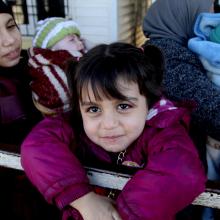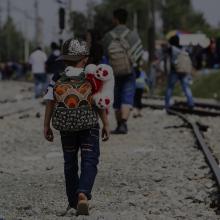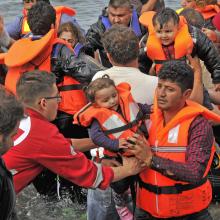Paris
The reported decision comes on the heels of a letter from 22 Republican senators to the president, urging him to withdraw from the major international agreement reached under President Obama in 2015. The deal, which aims to cut greenhouse gas emissions by significantly reducing participating nations’ reliance on fossil fuels, took effect shortly before the U.S. presidential election in November 2016. It was hailed as a significant achievement for Obama’s climate legacy.
According to two extensive recent opinion polls, majorities across Europe are deeply concerned about Muslim immigration and support an immediate end to it, even as Europeans vastly overestimate the actual Muslim populations of their countries.
Voters in several countries back a complete immigration ban at levels notably higher than those in the United States. Anti-immigration politicians in Poland, Hungary, and elsewhere are gaining ground in Western Europe.

Syrian refugees who came from Aleppo waiting at the refugee camp in Essalame border gate on Turkey - Syria border in Essalame, Syria in February. gungorkarakus / Shutterstock.com
The Christian tradition calls its followers not to bear false witness. So how do we live out this calling? What does it mean not to bear false witness against Muslims in the age of ISIS? Here are three false assumptions, if not outright lies, often repeated about Muslims and terrorism, along with some facts that can help us have more honest conversations about our Muslim neighbors and about the violence we encounter in western nations.

Image via Drop of Light / Shutterstock.com
Pope Francis hailed the “historic” climate change agreement signed in Paris, urging the international community to swiftly implement the deal.
Speaking to the faithful in St. Peter’s Square on Dec. 13, Francis called on world leaders to act on the unprecedented environmental agreement signed on Dec. 12 by nearly 200 countries.
“The conference on climate has just finished in Paris with the adoption of an agreement, defined by many as historic. Carrying it out will require a unanimous commitment and generous dedication on everyone’s part,” he said.

Ukrainian Global Climate March on the eve of the COP21 summit. Furyk Nazar / Shutterstock.com
It was not so long ago that the cobblestones of Paris were red with blood. November 2015: terrorism. 1940: WWII. 1914: WWI. 1871: Prussians (post Napoleon). 1789: Revolution. One could keep going: 1479 – Joan of Arc.
With such a history in mind, and with politicians screaming “crusades” not so far away, it is no small thing to witness thousands upon thousands of people gathered to sit at tables with laptops and coffee and microphones and to talk to one another, countries who have warred with one another and taken one another’s trees and lakes and minerals. Here are 190 countries – not counting the many indigenous nations still unrecognized but many of which are still present.

Screenshot via vatican / Youtube
An extraordinary illuminated projection of images of the natural world onto St. Peter’s Basilica on the evening of Dec. 8 drew thousands of awed spectators to the Vatican and delighted untold numbers more watching online and via widespread media coverage of the three-hour show.
But not everyone was happy with the spectacle, not by a long shot, as social media and conservative Catholic sites erupted with indignation.
“This has gone beyond ridiculous,” fumed a conservative blogger, the Rev. John Zuhlsdorf, who called it “irreverent” to use a sacred space for a secular purpose.
“Why not rent out the Sistine chapel too, while they’re at it?”

Image via BlackMac / Shutterstock.com
French authorities announced Dec. 2 that they shut down three radicalized mosques.
After the Nov. 13 attacks in Paris, the government proclaimed a state of emergency, which grants it wide latitude to conduct searches, make arrests, and ban public gatherings.

Image via Brandalism
The French government has banned mass gatherings during COP21 in Paris. So protesters have gotten creative.
The organization Brandalism has posted 600 pieces of artwork and fake advertisements all over the city that mimic real advertisements but actually denounce politicians and corporations for their apathy toward climate change.

Image via Nando Machado/Shutterstock.com
Hate crimes in America dipped across the board in 2014, except in the category of anti-Muslim crimes, which rose about 14 percent over the prior year. Given the barbaric Islamic State attacks in Paris last week and elsewhere recently, that latter trend seems destined to accelerate.
The presence of hate crimes against Muslims is no new phenomenon. Prior to the 9/11 attacks, there typically recorded between 20-30 hate crime against Muslims per year and after 2001 that number rose to nearly 500.
This summer, we saw the murder of three Muslim students in Chapel Hill, N.C. On Nov. 15 in London, a man pushed a Muslim woman into an oncoming underground train. And on Thanksgiving Day, a man in a taxicab in Pittsburgh, Pa., shot his driver in the back for being Muslim.
These incidents do not need to be listed as statistics to validate reality but they do need to be heard.
I was part of the United Methodist delegation to Rio de Janeiro in 1992 during the world’s first major gathering of world leaders, nongovernmental organizations, and corporate heads to focus on climate change and related environmental and development issues. It was clear even then that environmental concerns could not be effectively addressed without simultaneously addressing poverty and inequity.
As of Nov. 30, government officials, corporate leaders, and nongovernmental organizations are meeting for the 21st session of the Conference of the Parties (COP 21) for climate negotiations, this time in Paris. World leaders and other official summit attendees will be protected by greatly enhanced security because of recent terrorist attacks. Civil society won’t enjoy such protections, as indicated by the prohibition of planned demonstrations in Paris.
Some are still demonstrating in Paris, including people committed to nonviolence who formed a 10,000 person human chain and left 20,000 empty shoes — including a pair of the Pope’s shoes — to represent the protestors who are not allowed to demonstrate. Still, around the world, people are gathering to pray for the success of the climate talks and for peace.

Image via Chepko Danil Vitalevich/Shutterstock.com
"The biggest open question in Paris may be how much aid goes to poor countries trying to leapfrog fossil fuels,” Bill McKibben, Schumann Distinguished Scholar at Middlebury College and founder of 350.org, said.
“For reasons both moral and practical the number should be large — larger than it likely will be."
As we think about the future of our children and our grandchildren, we need to rethink our use of water: how we store it, how we carry it and how we drink it. Water is a human necessity. Our ignorance can lead to the irony of spoiling watersheds — by robbing them of potable water while introducing mountains of plastic waste, impervious to decays which produce useful soils, and diverting water from useful work.
I’ve heard it said that you don’t know true love until you hold your baby for the first time. I hate that, for so many reasons. And I hate whoever has said it to me or anyone else. Hate it.
This may come as a shock, but I’ve got the slightest anger issue. It’s more accurate to say I didn’t know true anger until I became a mother.
There’s the daily anger, like slaving away in the kitchen for hours only to have people gag and demand crunchy toast and cookies to eat, while they scream and scratch their sister and slip on spilled water and cry for hours. There’s the hourly anger, like the struggle between wanting to check out and check e-mail in the face of little people wanting to play or needing to be disciplined.

Image via Ververidis Vasilis/Shutterstock.com
As we stand together around the world, shocked and mourning with the thousands who lost their fathers, mothers, sisters, brothers, relatives, and friends in France, Lebanon, and Iraq, one thing bothers me most about the narrative around the terrorist attacks in Paris.
From the moment first reports started streaming in from France, even when the details surrounding the tragedy were very scarce, mainstream media pundits were far too eager to bring Syrian refugees into the story of the Paris massacre. They planted the seeds of doubt into the minds of millions that somehow Syrian refugees shared responsibility for the massacre.
Two months ago I worked on the last several miles of the refugee trail from Syria, Iraq, and Afghanistan to the Croatian border. I helped drive nearly 100 refugees to the border, and distributed food, water, clothes, and shoes to at least 2,000 more.
I still remember the stories of some who did not hesitate to tell my team why they left Syria or Iraq.

Syrian refugees arrive in Lesvos, Greece in October. Anjo Kan / Shutterstock.com
Whether you like it or not, Christians are called to help the world’s most abused, hurt, helpless, exploited, and destitute.
If you’re a follower of Christ passionate about social justice, of if you attend a church that claims to be enthusiastic about global missions, or if you’re part of a Christian organization that facilitates ministry, you’ve been handed a golden opportunity — the ability to minister to millions of people in desperate need.
This is a chance to be radically countercultural — to glorify Christ through selfless sacrifice, hospitality, and love. Being a Christ-follower isn’t easy, and it will require hard work, but it’s worth it.

Image via yuri4u80/Shutterstock.com
Just like you, I was horrified when I learned of the terror attacks in Paris on Nov. 13. The scale, precision, and barbarity of these crimes are hard to fathom.
My first reaction was sadness for the victims and a desire for peace. My second was a sense of mild panic. If they can do this in Paris, they can certainly do it in my city!
My third reaction, one I’m not particularly proud of: I thought about how much I’d like to see the people responsible for these acts hunted down and destroyed.
I’ve been thinking a lot about 9/11 lately. I remember the way that we as a nation went through a similar three-step process. We went from shock and sympathy to fear and paranoia, and finally to the conviction that we must annihilate those who attacked us.
It all happened so quickly.

Image via Christian Hartmann / REUTERS / RNS
Pope Francis raised the specter of a World War III “in pieces,” Muslims issued statements of condemnation, while evangelical Christians in America debated whether to speak of a “war with Islam.”
These were some of the responses by religious leaders around the world on Nov. 14 to the series of attacks overnight in Paris which left more than 120 people dead.
“This is not human,” Francis said phone call to an Italian Catholic television station. Asked by the interviewer if it was part of a “Third World War in pieces,” he responded: “This is a piece. There is no justification for such things.”
A multi-site violent attack appears to have taken place in Paris, reports The Telegraph. There have been reports of Kalashnikov (AK-47) fire, grenade explosions, and hostages taken. As of 9:42 p.m. local time Paris, the French police reported 20 dead.
As the world looks toward the United Nations Conference on Climate Change in Paris in December, it would serve us all to reflect on California.
When I moved to California in August 1991, the state’s five-year drought changed the most mundane aspects of life. Throughout my East Coast childhood, this is how I learned to brush my teeth: Turn the knob on the sink, place the toothbrush under the running water, brush, spit, brush again, spit again, place your Dixie cup under the running water, rinse your teeth, gargle, spit, use the running water to rinse the sink of all your spit, then — and only then — turn the water off.
I performed that basic ritual during my first week in Los Angeles. My roommate scowled. She had moved to LA years before and had lived through the state’s drought. Over the course of those five years, every resident of California had taken ownership of the state’s dire situation by altering the daily routines of their lives.
Common measures included: placing bricks in the backs of toilets to use less flushing water, only flushing once or twice a day, only using the absolute minimum amount of water necessary to brush one’s teeth, cooler time-tight showers, and the list goes on.
History records my first months in Los Angeles as the tail end of the state’s late 1980s drought. People danced in the streets of South Central, East LA, and Santa Monica as El Niño’s waters soaked cracked earth in late 1991. But as citizens of a state in crisis, our shared sense of duty had transformed small changes in daily routines into a collective culture of conservation. In fact, to this day, many Californians still practice those same measures.
But it’s been 24 years since those dire days and California is fighting again, slugging into its fourth year of another drought. But this one is different. This is the worst drought in 1,200 years, according to a study published in the American Geophysical Union journal.
Standing in a brown field that should have been packed with several feet of snow on the first day of Earth Month, California Gov. Jerry Brown said: “It’s a different world. We have to act differently.”
Our first response to the horrible and frightening violence of Paris should be grief. False religion always makes the religious grieve, but when it engages in ghastly violence against other human beings who are made in God’s image, it should break our hearts as it breaks God’s.
These hateful terrorists, masquerading as religious believers, said on video they were the “avengers” of the prophet Mohamed. As such, they murdered cartoonists in the office of a magazine they identified with blasphemy. What these killers, and those like them, don’t understand is that they are the real blasphemers now by forcing their false and murderous distortions of Islam on the world and on other children of God. Their religion is now violence itself, a blasphemous interpretation of Islam, which in its truest expression is a religion of peace. Rev. Wes Granberg-Michaelson, from the Reformed Church in America, has called Paris an “identity theft” of the Muslim faith. Several Muslim leaders have said that the damage terrorists like these do to the image of the Prophet Mohammed is much greater than any cartoonist could ever do.
While the tenet of freedom of speech has been invoked throughout the media coverage of the attacks, the religious implications here run much deeper. They are about how we in the faith community should respond when we are attacked by those who disdain us, disrespect us, distort us — as many believe the satirical French magazine, Charlie Hebdo regularly did — and even viciously attack us. The magazine has often crudely, provocatively, and even gleefully satirized all religions in very offensive ways, suggesting that the fundamentalisms in all our religious traditions completely define the meaning of faith. Charlie Hebdo is apparently driven by its own ideology of secular fundamentalism, which regularly strikes out at all people of faith.
The real war on terror is not a war on Western values or American values. It is evil perpetuating crimes of power and control, and its costs are measured in real in human lives. Those lives are largely black and brown, and the focus on the danger to America with its resulting protectionism and cultural-centrism is endangering lives long term.
Church, let us not join in the narrative of self-preservation. Let us not value those who look and think like our own community more than those who are culturally different. Let us not value the wealthy more than the impoverished. Let justice-speech ring from our pulpits, and let love for the culturally different be reflected in our prayers and our financial endeavors. For the world to hear that in Christ all lives matter, we the Body must speak loudly and demonstrate that #blacklivesmatter #brownlivesmatter.







